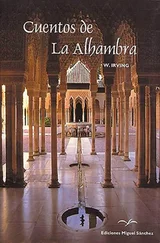The parrot was nettled at the question. “I have consoled many beautiful ladies in my time,” said he; “but let that pass. At present I come ambassador from a royal prince. Know that Ahmed, the prince of Granada, has arrived in quest of thee, and is encamped even now on the flowery banks of the Tagus.”
The eyes of the beautiful princess sparkled at these words even brighter than the diamonds in her coronet. “O sweetest of parrots,” cried she, “joyful indeed are thy tidings, for I was faint and weary, and sick almost unto death with doubt of the constancy of Ahmed. Hie thee back, and tell him that the words of his letter are engraven in my heart, and his poetry has been the food of my soul. Tell him, however, that he must prepare to prove his love by force of arms; tomorrow is my seventeenth birthday, when the king my father holds a great tournament; several princes are to enter the lists, and my hand is to be the prize of the victor.”
The parrot again took wing, and rustling through the groves, flew back to where the prince awaited his return. The rapture of Ahmed on finding the original of his adored portrait, and finding her kind and true, can only be conceived by those favored mortals who have had the good fortune to realize daydreams and turn a shadow into substance: still there was one thing that alloyed his transport — this impending tournament. In fact, the banks of the Tagus were already glittering with arms, and resounding with trumpets of the various knights, who, with proud retinues, were prancing on towards Toledo to attend the ceremonial. The same star that had controlled the destiny of the prince had governed that of the princess, and until her seventeenth birthday she had been shut up from the world, to guard her from the tender passion. The fame of her charms, however, had been enhanced rather than obscured by this seclusion. Several powerful princes had contended for her hand; and her father, who was a king of wondrous shrewdness, to avoid making enemies by showing partiality, had referred them to the arbitrament of arms. Among the rival candidates were several renowned for strength and prowess. What a predicament for the unfortunate Ahmed, unprovided as he was with weapons, and unskilled in the exercise of chivalry! “Luckless prince that I am!” said he, “to have been brought up in seclusion under the eye of a philosopher! Of what avail are algebra and philosophy in affairs of love? Alas, Eben Bonabben! why hast thou neglected to instruct me in the management of arms?” Upon this the owl broke silence, preluding his harangue with a pious ejaculation, for he was a devout Mussulman.
“Allah Akbar! God is great!” exclaimed he; “in his hands are all secret things — he alone governs the destiny of princes! Know, O prince, that this land is full of mysteries, hidden from all but those who, like myself, can grope after knowledge in the dark. Know that in the neighboring mountains there is a cave, and in that cave there is an iron table, and on that table there lies a suit of magic armor, and beside that table there stands a spellbound steed, which have been shut up there for many generations.”
The prince stared with wonder, while the owl, blinking his huge round eyes, and erecting his horns, proceeded.
“Many years since, I accompanied my father to these parts on a tour of his estates, and we sojourned in that cave; and thus became I acquainted with the mystery. It is a tradition in our family which I have heard from my grandfather, when I was yet but a very little owlet, that this armor belonged to a Moorish magician, who took refuge in this cavern when Toledo was captured by the Christians, and died here, leaving his steed and weapons under a mystic spell, never to be used but by a Moslem, and by him only from sunrise to mid-day. In that interval, whoever uses them will overthrow every opponent.”
“Enough, let us seek this cave!” exclaimed Ahmed.
Guided by his legendary mentor, the prince found the cavern, which was in one of the wildest recesses of those rocky cliffs which rise around Toledo; none but the mousing eye of an owl or an antiquary could have discovered the entrance to it. A sepulchral lamp of everlasting oil shed a solemn light through the place. On an iron table in the centre of the cavern lay the magic armor, against it leaned the lance, and beside it stood an Arabian steed, caparisoned for the field, but motionless as a statue. The armor was bright and unsullied as it had gleamed in days of old; the steed in as good condition as if just from the pasture; and when Ahmed laid his hand upon his neck, he pawed the ground and gave a loud neigh of joy that shook the walls of the cavern. Thus amply provided with “horse and rider and weapon to wear,” the prince determined to defy the field in the impending tourney.
The eventful morning arrived. The lists for the combat were prepared in the vega, or plain, just below the cliff-built walls of Toledo, where stages and galleries were erected for the spectators, covered with rich tapestry, and sheltered from the sun by silken awnings. All the beauties of the land were assembled in those galleries, while below pranced plumed knights with their pages and esquires, among whom figured conspicuously the princes who were to contend in the tourney. All the beauties of the land, however, were eclipsed when the princess Aldegonda appeared in the royal pavilion, and for the first time broke forth upon the gaze of an admiring world. A murmur of wonder ran through the crowd at her transcendent loveliness; and the princes who were candidates for her hand, merely on the faith of her reported charms, now felt tenfold ardor for the conflict.
The princess, however, had a troubled look. The color came and went from her cheek, and her eye wandered with a restless and unsatisfied expression over the plumed throng of knights. The trumpets were about sounding for the encounter, when the herald announced the arrival of a strange knight; and Ahmed rode into the field. A steel helmet studded with gems rose above his turban; his cuirass was embossed with gold; his cimeter and dagger were of the workmanship of Fez, and flamed with precious stones. A round shield was at his shoulder, and in his hand he bore the lance of charmed virtue. The caparison of his Arabian steed was richly embroidered and swept the ground, and the proud animal pranced and snuffed the air, and neighed with joy at once more beholding the array of arms. The lofty and graceful demeanor of the prince struck every eye, and when his appellation was announced, “the Pilgrim of Love,” a universal flutter and agitation prevailed among the fair dames in the galleries.
When Ahmed presented himself at the lists, however, they were closed against him: none but princes, he was told, were admitted to the contest. He declared his name and rank. Still worse! — he was a Moslem, and could not engage in a tourney where the hand of a Christian princess was the prize.
The rival princes surrounded him with haughty and menacing aspects; and one of insolent demeanor and herculean frame sneered at his light and youthful form, and scoffed at his amorous appellation. The ire of the prince was roused. He defied his rival to the encounter. They took distance, wheeled, and charged; and at the first touch of the magic lance, the brawny scoffer was tilted from his saddle. Here the prince would have paused, but alas! he had to deal with a demoniac horse and armor; once in action nothing could control them. The Arabian steed charged into the thickest of the throng; the lance overturned every thing that presented; the gentle prince was carried pell-mell about the field, strewing it with high and low, gentle and simple, and grieving at his own involuntary exploits. The king stormed and raged at this outrage on his subjects and his guests. He ordered out all his guards — they were unhorsed as fast as they came up. The king threw off his robes, grasped buckler and lance, and rode forth to awe the stranger with the presence of majesty itself Alas! majesty fared no better than the vulgar; the steed and lance were no respecters of persons; to the dismay of Ahmed, he was borne full tilt against the king, and in a moment the royal heels were in the air, and the crown was rolling in the dust.
Читать дальше












